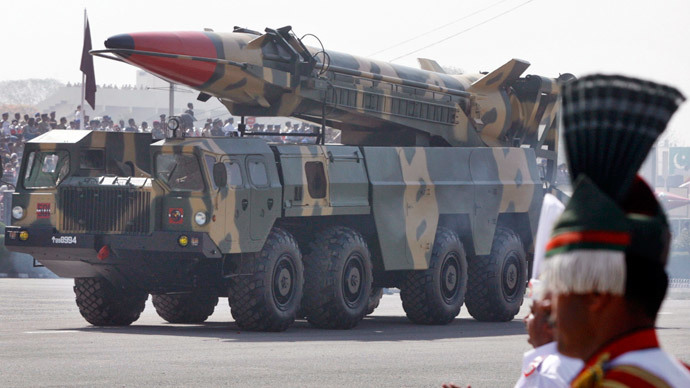S. Arabia calls in off-the-shelf nuke option with Pakistan – report

At the prospect of the international community’s nuclear deal with Iran, Saudi Arabia has reportedly taken a decision to call in an old favor from Pakistan and get some of its nuclear weapons.
Saudi Arabia is widely believed to have bankrolled the Pakistani nuclear weapons program. In exchange, Riyadh reportedly expects Islamabad to provide missiles in times of trouble to defend the kingdom.
“For the Saudis the moment has come,” a former American defense official told The Sunday Times newspaper. “There has been a longstanding agreement in place with the Pakistanis, and the House of Saud has now made the strategic decision to move forward.”
According to the report, no actual transfer of weapons has taken place yet, but “the Saudis mean what they say and they will do what they say,” the source reportedly said.
#Iran insists #Israel ‘give up the bomb’ as Tehran seeks nuclear-free Middle East http://t.co/toHPgMxWv7pic.twitter.com/pNbRX1vtMv
— RT (@RT_com) April 27, 2015
The report comes a month ahead of a meeting between Tehran and the P5+1 group to finalize a deal, which would lift sanctions from Iran in exchange for making its nuclear program more transparent and restricted. Key US allies in the Middle East, Israel and Saudi Arabia, are objecting to the deal, saying it would ultimately allow Iran to acquire nuclear weapons.
Reports of Saudi Arabia getting nukes aren’t new. In November 2013, BBC’s Newsnight reported on the alleged nuclear sharing agreement between Saudi Arabia and Pakistan.
The program cited Amos Yadlin, a former head of Israeli military intelligence, telling a conference in Sweden that if Iran got the bomb, "the Saudis will not wait one month. They already paid for the bomb, they will go to Pakistan and bring what they need to bring."
The speculation came just as nuclear talks between Iran and the P5+1 were showing progress in Geneva.
READ MORE: China rapidly upgrading nuclear arsenal with MIRVed missiles – report
Some experts, however, doubted that the supposed nuclear arming by Saudi Arabia was as simple as calling in the debt.
“I doubt that Pakistan is ready to send nuclear weapons to Saudi Arabia,” Mark Fitzpatrick, a non-proliferation expert with the International Institute for Strategic Studies, told the Guardian at the time.
“Pakistan's reputation suffered greatly the last time they assisted other countries with nuclear weapons technology (i.e., the sales by [Pakistani nuclear project chief] A.Q. Khan, with some governmental support or at least acquiescence, to North Korea, Iran and Libya). Pakistan knows that transferring nuclear weapons to Saudi Arabia would also incur huge diplomatic and reputational costs.”
The potential of a nuclear arms race in the Middle East triggered by the Iran deal is one of the argument critics use to denigrate the talks. At the moment there are several countries in the region known or believed to have nuclear weapons.
Pakistan has a stockpile of 80 to 120 warheads designed to counterbalance India’s arsenal, while Turkey hosts NATO nuclear weapons. Israel is said to have a stockpile, although it has never officially confirmed this.
Several other nations have civilian nuclear programs, including Iran, Egypt and UAE.












